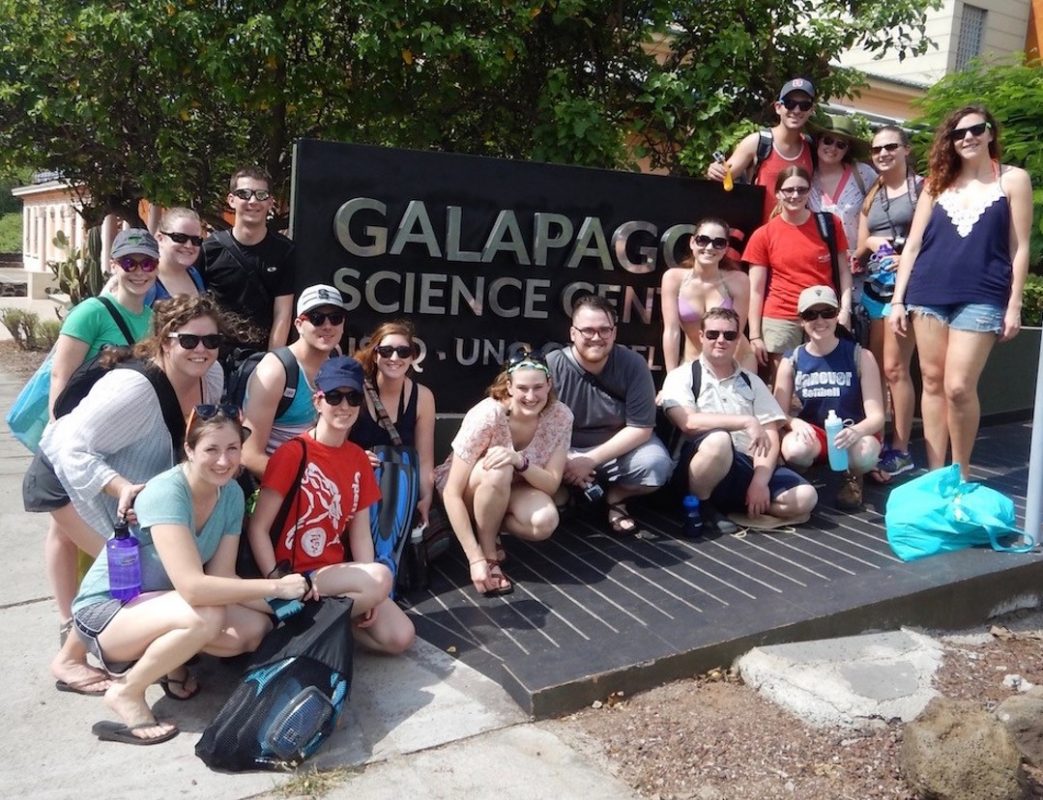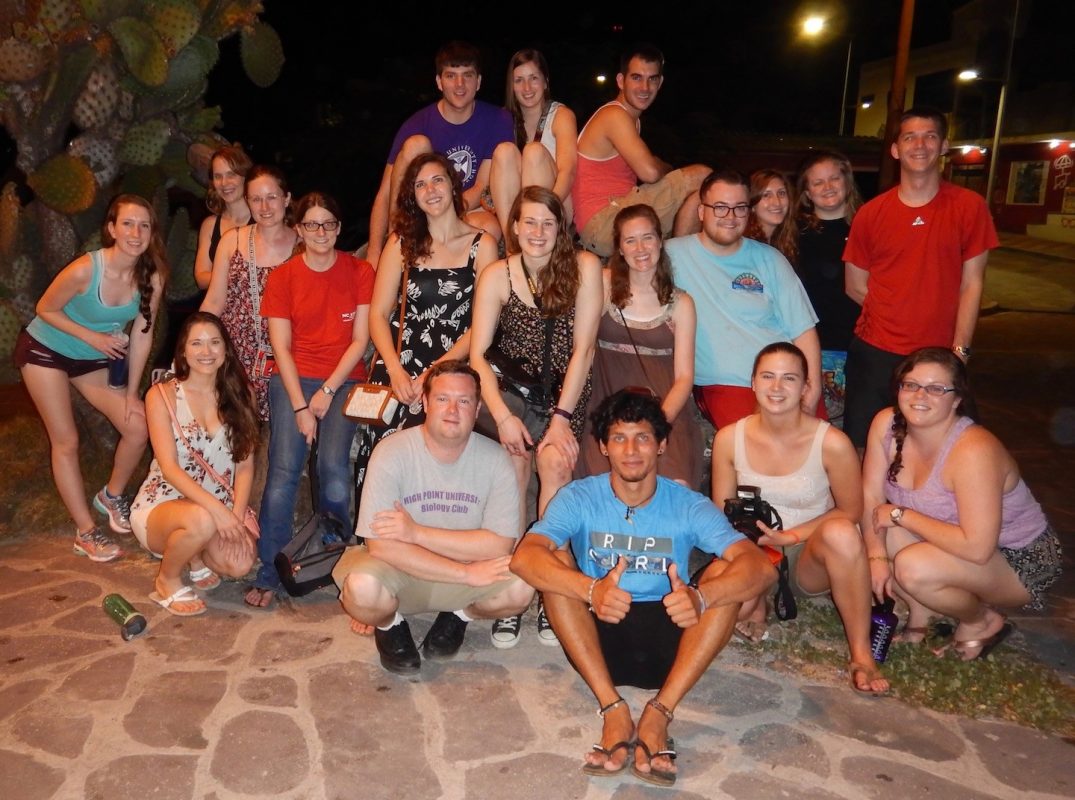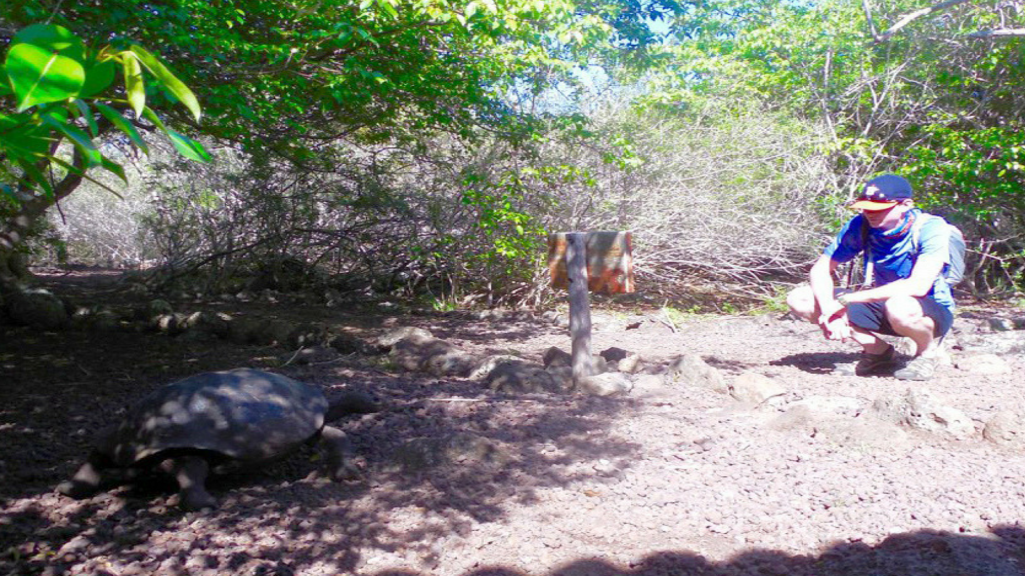Galápagos Elective
Conservation and ecology in Ecuador.

Each year, veterinary students travel to islands within the Galápagos archipelago to study conservation and ecology in Ecuador, a country with different resources, health challenges, and economic drivers.
Overview
- Credits: 1
- Duration: 9 days
- Semester: Spring
![]() The ability to work with animals in a foreign country while navigating different environments, cultures and resources is fundamental to working in global health.
The ability to work with animals in a foreign country while navigating different environments, cultures and resources is fundamental to working in global health.
At NC State’s College of Veterinary Medicine, the Galápagos elective, led by Greg Lewbart, provides veterinary students with the opportunity to observe and in some cases work with wildlife across the Galápagos islands, and learn about the archipelago’s natural history, cultural offerings, and the logistics of improving animal health in sparsely inhabited locations.
During the trip, students travel to the Galápagos Science Center, which serves as the base of operations, and participate in lectures, laboratory sessions and learning excursions. Topics cover a variety of zoological and medical topics related to native invertebrates, fish, reptiles, birds and mammals, with a particular emphasis on aquatic species. After returning to NC State, students are required to complete an essay on a topic pertinent to the experience.

Course Coordinator

Gregory Lewbart
Professor of Aquatic Animal Medicine, Department of Clinical Sciences
- Office: C-295
- Office hours: By appointment
- Phone: 919-513-6439
- Email: greg_lewbart@ncsu.edu
Learning Outcomes
Students who complete the Galápagos elective are able to:
|
|
|
|
|
|
Publications
(Related to elective and Galápagos-based research)
Valle CA, Grijalva CJ, Calle PP, Muñoz-Pérez JP, Quezada G, Vera CA, Lewbart GA. Methods of body temperature assessment in Conolophus subcristatus and Conolophus pallidus (Galápagos land iguanas). PeerJ, 2018 (Accepted)
Cerreta AJ, Lewbart GA, Diaz R, Vasquez G, Muñoz-Pérez JP, Paéz-Rosas D. Chelonoidis chathamensis. Methods of body temperature assessment. Herpetological Review 2018 Dec; 49(4):696-697 (ResearchGate)
Phillips BE, Páez-Rosas D, Flowers JR, Cullen JM, Law JM, Colitz C, Deresienski D, Lohmann KJ, Lewbart GA. Evaluation of the ophthalmic disease and histopathologic effects due to the ocular trematode Philophthalmus zalophi on juvenile Galápagos sea lions (Zalophus wollebaeki). J Journal of Zoo and Wildlife Medicine 2018 Sep; 49(3):581-590. (Resident as first author; G.L. as primary mentor) (Pubmed)
Arguedas-Porras R, Lewbart GA, Deresienski D, Lohmann K, Steinberg D, Muñoz-Pérez JP, Valle CA. Haematology and biochemistry of the San Cristobal Lava Lizard (Microlophus bivittatus). Conservation Physiology 2018 Aug; 6(1):10.1093/conphys/coy046 (Pubmed)
Valle CA, Ulloa C, Deresienski D, Regalado C, Muñoz-Pérez JP, Garcia J, Hardesty BD, Skehel A, Lewbart GA. Health status of great frigatebirds (Fregata minor) determined by hematology, biochemistry, blood gases, and physical examination. Conservation Physiology 2018 Jul; 10.1093/conphys/coy034 (G.L. corresponding author) (Pubmed)
Lewbart GA, Cohen E, Hirschfeld M, Muñoz-Pérez JP, García J, Fu A, Chen EP, Lohmann KJ. Field-based radiographic imaging of marine megafauna: Marine iguanas (Amblyrhynchus cristatus) as a case study. Frontiers In Marine Science 2018 Feb; doi: 10.3389/fmars.2018.00040 (View Article)
Lewbart GA, Griffioen JA, Savo A, Muñoz-Pérez JP, Ortega C, Loyola A, Roberts S, Schaaf G, Steinberg D, Osegueda SB, Levy MG, Páez-Rosas D. Biochemistry and hematology parameters of the San Cristóbal Galápagos tortoise (Chelonoidis chathamensis). Conservation Physiology 2018 Feb; 6(1): coy004 (Pubmed)
Lewbart GA, Ulloa C, Deresienski D, Rigaldo C, Muñoz-Pérez, Garcia J, Hardesty BD, Valle CA. Health status of red-footed boobies (Sula sula) determined by hematology, biochemistry, blood gases, and physical examination. Journal of Zoo and Wildlife Medicine 2017 Dec; 48(4):1230-1233 (Pubmed)
Muñoz-Pérez JP, Lewbart GA, Hirschfeld M, Denkinger J, Castañeda JG, García J, Lohmann KJ. Blood gases, biochemistry, and haematology of Galápagos hawksbill turtles (Eretmochelys imbricata). Conservation Physiology 2017 May; 5(1): cox028; doi:10.1093/conphys/cox28. (G.L. corresponding author) (Pubmed)
Lewbart GA, Valle C, Muñoz-Perez J. Microlophus indefatigabilis diet. Herpetological Review 2017; 48(4):851-852
Lewbart GA, Hirschfeld M, Ricuarte O, Lohmann. Amblyrhynchus cristatus diet. Herpetological Review 2017; 48(2):439.
Paéz-Rosas D, Hirschfeld M, Deresienski D, Lewbart GA. Health status of Galápagos sea lions (Zalophus wollebaeki) on San Cristobal Island rookeries determined by hematology, biochemistry, blood gases, and physical examination. Journal of Wildlife Diseases 2016 Jan; 52(1):100-105. (G.L. corresponding author) (Pubmed)
Lewbart GA, Hirschfeld M, Muñoz J, Denkinger J, Vinueza L, Brothers JR, García J, Lohmann. KJ. Blood gasses, biochemistry, and hematology of marine iguanas (Amblyrhynchus cristatus). Conservation Physiology 2015 Jul; 3(1): cov034; doi: 10.1093/conphys/cov034 (Pubmed)
Lewbart GA, Hirschfeld M, Denkinger J, Vasco K, Guevara N, García J, Muñoz J, Lohmann, KJ. Blood gasses, biochemistry, and hematology of Galápagos green turtles (Chelonia mydas). PLoS ONE 2014 May; 9(5): e96487. doi:10.1371/journal.pone.0096487 (Pubmed)
STUDY ABROAD SPOTLIGHT:
Meet McCaide Wooten
McCaide Wooten talks about the Galápagos elective and studying abroad.
Read MoreReturn to: Global Health Training


